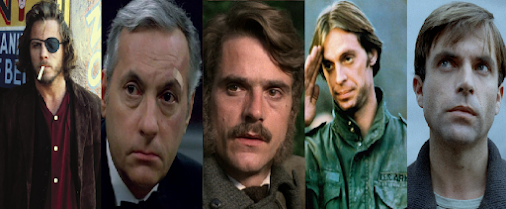5. Sam Neill in Possession - Neill gives a scattershot yet potent performance that matches his insane film, though he is overshadowed by his co-star.
Best Scene: Rocking Chair
4. Jeremy Irons in The French-Lieutenant's Woman - Irons is able to deliver honest and power to both forbidden romances of very different ilks.
Best Scene: A late visit.
3. Keith Carradine in Southern Comfort - Carradine gives a striking performance through his calm yet incisive demeanor.
Best Scene: Making decisions.
2. Michel Serrault in Garde à Vue - Serrault effectively delivers a tricky performance that is convincing in creating the sense of a man in an emotionally heightened state.
Best Scene: Seeing something horrible.
1. John Heard in Cutter's Way - Good predictions Robert, Ytrewq & Calvin. Heard proves he was perhaps a largely untapped talent with this powerfully intense portrait of a wounded war vet attempting a strange sort of revenge.
Best Scene: Cutter's reasoning for his plan.
Next: 81 Supporting






